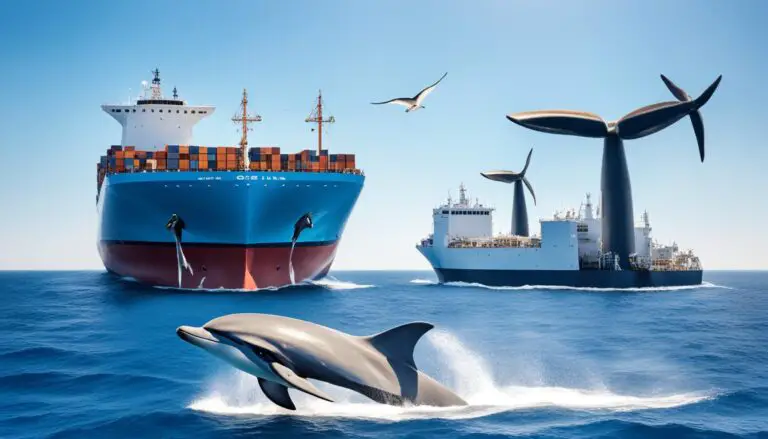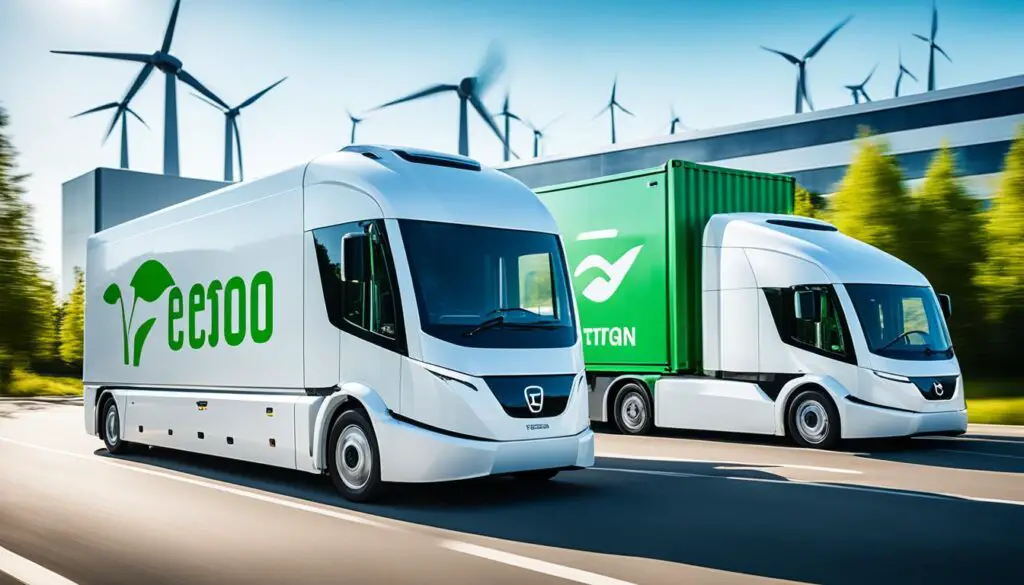Looking at the future, it’s key to tackle the logistics industry’s environmental impact. Eco-friendly logistics brings in green shipping and sustainable practices. This approach is vital for reducing carbon emissions and bettering our supply chain.
Old logistics ways led to a lot of greenhouse gas emissions. But, by using eco-conscious methods, firms can be responsible. At the same time, they can save money, prepare for resource shortages, and stand out in a green market.
Key Takeaways:
- Eco-friendly logistics aims to reduce the environmental impact of transportation and distribution.
- Sustainable practices offer cost savings, resilience, and a competitive edge in the market.
- The logistics sector contributes significantly to global CO2 emissions and resource consumption.
- Electric vehicles (EVs) and alternative fuels are being explored as sustainable transportation options.
- Technology plays a crucial role in enabling sustainable logistics.
The Rise of EVs in Logistics
The logistics industry is moving towards green transport, and electric vehicles (EVs) stand out as a key solution. EVs help reduce carbon emissions and cut down noise in cities.
EVs have no tailpipe emissions, unlike typical cars and trucks. This makes them a green choice for logistics. Companies can cut down their carbon emissions by using EVs.
EVs can also save money over time. They may cost more at first, but they’re cheaper to run and maintain. As charging gets easier and costs come down, EVs become a better deal.
In cities, EVs are great because they make less noise. They let logistic companies make deliveries without bothering people. This is especially important for delivering goods to the door.
But, using EVs widely in logistics faces some hurdles. One major issue is “Range anxiety.” EVs can’t go as far as gas vehicles on a full charge. Better batteries and more charging stations are needed.
Having enough places to charge EVs is crucial. A good network of charging stations keeps EVs running smoothly. This helps avoid problems with their limited range.
Heavy-duty EVs are pricey, making it hard for logistics companies to buy them. These companies need big vehicles for long hauls. More research and development can help lower these costs.
EVs offer a big chance for logistics to go green. They bring benefits like no emissions and saving money over time. Logistics companies can help protect the environment and still get their jobs done.
| Advantages of EVs in Logistics | Challenges of EVs in Logistics |
|---|---|
|
|
Embracing Alternative Fuels in Transport
The transport industry is looking for greener fuels to replace old ones like gasoline. They want to cut down pollution and push for green logistics. There are a few good options out there like biodiesel, hydrogen, and natural gas. Picking the right fuel depends on what it’s needed for and unique needs.
Biodiesel: A Sustainable Option in Logistics
Biodiesel comes from things like vegetable oils or animal fats. It’s a good alternative for greener transport. It lessens greenhouse gases, helping make a more eco-friendly future.
- Reduced Greenhouse Gas Emissions: Biodiesel gives off fewer greenhouse gases than regular diesel. This is great for making logistics greener.
- Biodegradability: Biodiesel is nature-friendly because it can break down naturally. This makes it a top pick for green transport.
But making a lot of biodiesel could use up too much farm resources. It might even affect food supply. So, it’s important to get materials thoughtfully to keep biodiesel eco-friendly.
Hydrogen: A Clean Fuel for Sustainable Transport
Hydrogen is another fuel that could make transport cleaner. Its best points include:
- Zero Emissions: Burning hydrogen only makes water vapor. This means it’s super clean for the environment.
- Versatility: Hydrogen works for many transport types, like fuel cell vehicles. It’s flexible for different transport needs.
But to really use hydrogen widely, we need more infrastructure. Things like fuel stations and distribution systems are essential. Cooperation and ongoing research are key for hydrogen to succeed.
Natural Gas: A Lower-Emission Fuel Alternative
Natural gas, especially when compressed (CNG), is becoming popular for cleaner transport. Its benefits are:
- Emissions Reduction: Using natural gas means fewer greenhouse gases and pollutants. This makes transport much cleaner.
- Abundance: There’s a lot of natural gas available. This means a steady supply for transport needs.
Switching to natural gas needs investment in things like CNG stations and special engines. Companies should think about costs and if it fits their operations.
The logistics world has several alternative fuels to pick from for a more sustainable impact. Whether it’s biodiesel, hydrogen, or natural gas, each has its pros and cons. By choosing wisely, the transport sector can help our planet a lot.
Conclusion
The logistics industry is at a critical point. It must adopt sustainable practices now. This means making transportation and distribution more eco-friendly, using technology, and following new rules. Customer preferences are also pushing businesses to focus on sustainability.
To build a strong sustainability plan, companies need to improve their infrastructure. They should use eco-friendly vehicles and adopt new technologies like route optimization software. By tracking their environmental impact, they can find ways to improve and make smarter, greener choices.
Companies that go green can stand out and do better in today’s eco-aware market. By offering eco-friendly shipping and showing their green efforts, they can attract customers who care about the environment. This also helps improve their brand’s image.
Working with software companies that know a lot about green logistics is a smart move. These partnerships can help businesses overcome challenges and keep leading in their field. Through dedication to green practices and technology, businesses can thrive and make a positive impact on the environment.



